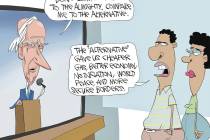What good is a degree if you can’t get a job?
Is it like that "Field of Dreams" movie? If you educate them, jobs will come.
Or is it more like: Which came first? The chicken or the egg?
President Barack Obama in his State of the Union address told us education is the key to this nation's competitiveness in the world economy and the creation of jobs.
"Of course, the education race doesn't end with a high school diploma. To compete, higher education must be within the reach of every American. That's why we've ended the unwarranted taxpayer subsidies that went to banks, and used the savings to make college affordable for millions of students. And this year, I ask Congress to go further, and make permanent our tuition tax credit -- worth $10,000 for four years of college. It's the right thing to do.
"By the end of the decade, America will once again have the highest proportion of college graduates in the world."
He seems to presume that if we spend enough money on diplomas for everyone, the jobs will come tagging along like Bo Peep's sheep.
"Our future is at stake," UNLV President Neal Smatresk said recently. "The future of our state is at stake. The future of the good students who are here is at stake.
"If you are concerned about the economic future of our state, then you have to be concerned about UNLV."
Another voice for equating the economy and jobs to higher education.
"There's a very close correlation between bachelor's degrees and technology," Rob Lang, director of Brookings Mountain West at UNLV, told those attending a conference called Nevada 2.0: New Economies for a Sustainable Future earlier this year. "We have lived off an industry (gaming) that was a great sector to provide a middle-class living for someone with a high school diploma. We're where Pittsburgh and Detroit were. We cannot use this engine to provide for the state budget."
Not wanting to derail this economic engine, the state's university system Board of Regents recently voted to not close any campus, despite the recession and reduced tax revenue. But there is talk of double-digit tuition and fee hikes in each of the next two school years on top of recent increases in fees of 50 percent.
Is there a point at which the return lags too far behind the investment in higher education, whether by the student or the taxpayer?
The Chronicle of Higher Education published a report in December by Richard Vedder revealing that from 1992 to 2008 there was a tripling in the number of college graduates working in jobs that did not require anything more than a high school education or less.
Hopefully, there is more to education than job skills and monetary reward, but where is the tipping point as costs escalate? A library card is a lot cheaper than college tuition.
Vedder, an Ohio University economist, and his researchers used Bureau of Labor Statistics data to discover that in 1992 there were 28.9 million employed college graduates. But 5.1 million, or 18 percent, of them worked in jobs BLS classified as "noncollege level jobs."
In 2008, there were 49.35 million working college graduates, of whom 17.4 million, or 35 percent, held jobs not requiring a degree.
Among Vedder's observations are:
-- "(T)he push to increase the number of college graduates seems horribly misguided from a strict economic/vocational perspective. It is precisely that perspective that is emphasized by those, starting with President Obama, who insist that we need to have more college graduates."
-- "Employers are using education as a screening and signaling device, at a low cost directly to them (although not costless because of the taxes they pay to sustain much of this), but at a high cost to the prospective employees and to society as a whole."
-- "Some in higher education KNOW about all of this and are keeping quiet about it because of their own self-interest. We are deceiving our young population to mindlessly pursue college degrees when very often that is advice that is increasingly questionable."
For many, a college education is a crapshoot. And Nevadans, of all people, should know the probable return on that "investment" and not give lip service to how wonderful a college diploma is for obtaining gainful employment.
First, there must be a job with which to repay those student loans.
Thomas Mitchell is senior opinion editor of the Review-Journal. He may be contacted at (702) 383-0261 or via e-mail at tmitchell@ reviewjournal.com.























